Teaching Shakespeare is the BSA’s magazine aimed at educators.
The editor of the BSA’s Teaching Shakespeare magazine is Myfanwy Edwards, who is a PhD student at UCL Institute of education where she is researching secondary school audiences of Macbeth. Myfanwy is also a full time Curriculum Leader of English at The Richmond Upon Thames School in west London and General Secretary of the London Association for the Teaching of English. She tweets @Miff_
Submissions
If you would like to submit material for publication in the magazine or would like further information about submissions, please write to Myfanwy using the Contact Us form (please select ‘Teaching Shakespeare’ from the drop-down menu for ‘Type of Enquiry).

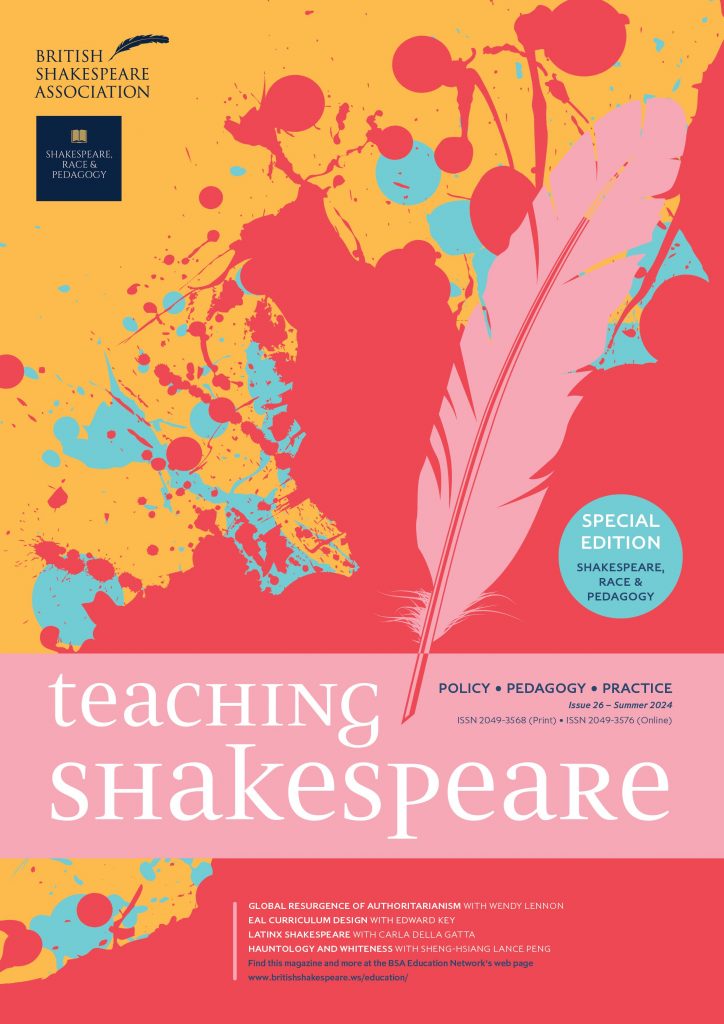
This issue is guest edited by Dr Wendy Lennon and is a special edition on Shakespeare, Race & Pedagogy. In this special edition, international contributors, who are both teachers and students of Shakespeare, offer insights into their experiences of teaching and learning about Shakespeare, and share their perspectives.
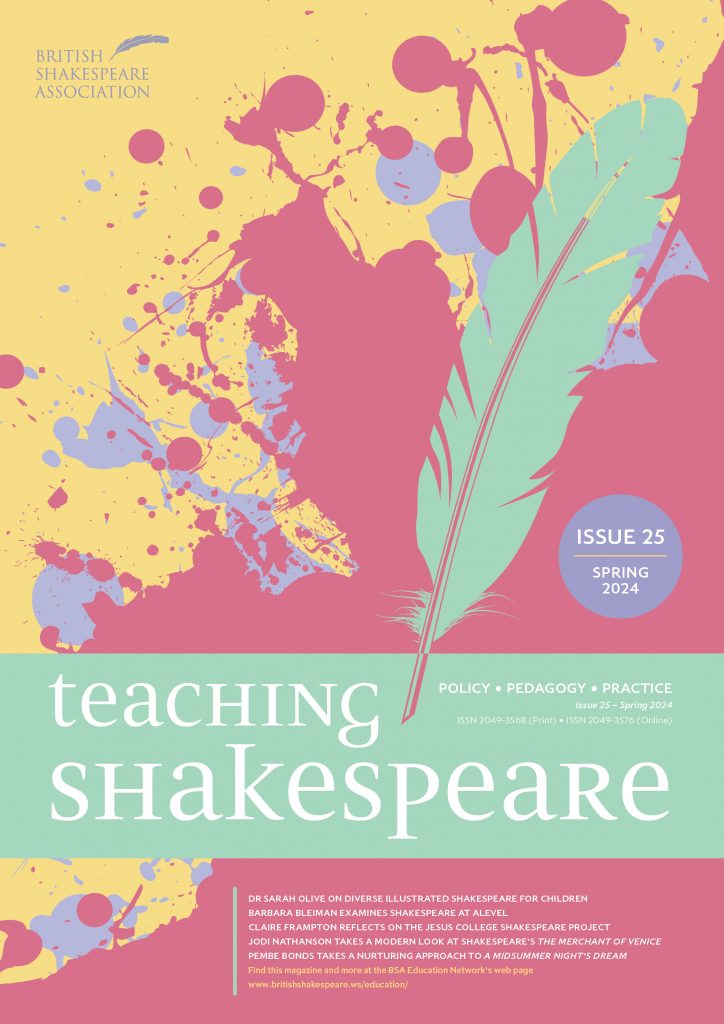
This issue contains a range of articles thinking about how we can consider the contexts in which our students will encounter the plays of Shakespeare, assess Shakespeare and present Shakespeare through performance and in unusual and diverse ways.
This issue contains a range of articles to get you thinking about your curriculum. Paul Yachnin reflects on teaching The Merchant of Venice; Heidi Drake questions the use of context at GCSE; Patrick Cragg suggest we see curriculum as literary context; Henry Sauntson uses elaborative enquiry; Cathy Millar explores student responses to a quiz on Hamlet; and Rowan MacKenzie reviews Shakespeare, Education and Pedagogy.
This issue of Teaching Shakespeare brings together a range of articles focusing on global adaptation, digital performances and exhibitions, sexuality, gender, and national identity.
This issue of Teaching Shakespeare has arisen from a conference run by the London Association for the Teaching of English, entitled ‘Other Shakespeare’s Are Possible’. It features contributions that explore play, offer perspectives on disrupting and decolonizing in the classroom, and consider the transformative power of live performance.
This issue, which focuses on teaching Shakespeare in lockdown, is guest edited by Ronan Hatfull, and features an exciting range of contributions on race, pedagogy, digital theatre and innovations, adaptation, and teaching practice.
This issue includes contributions on teaching Shakespeare in Jamaica, Japan, Saudi Arabia, the UK, and the US. Those working with students with English as an Additional Language, dyslexia and other specific learning difficulties will find relevant material for their work, so too those teaching plays from The Tempest to Hamlet.
A special issue based on ideas raised at the University of Warwick’s Teaching Early Modern Drama symposium. It addresses primary, secondary and tertiary education, and includes articles on Shakespeare in Iraq and Poland, as well as the application of early modern drama for social justice, mental health and prison education.
This issue includes articles on primary school Shakespeare, digital resources for teaching Shakespeare, and a student performance of Shakespeare in Vietnam. It also explores Shakespeare through a student’s eyes and medieval/early modern historical context.
A special issue on primary school Shakespeare, including activities for your classroom, from the Leeds Meets Shakespeare team.
Published in Autumn 2018, this is a special ‘guest takeover issue’ by colleagues at Toyo University. Articles include ‘Introduce Young English Language Learners to Shakespeare’ by Keita Kodama, ‘Perform Shakespeare with English Language Learners’ by Michael Randolph, and ‘Create Fearless Readers’ by Hirohisa Igarashi and Koji Morinaga.
Published in Summer 2018, this issue is dedicated to questions of policy, pedagogy and practice with regard to teaching Shakespeare. Contributions include articles by Victoria Elliot on ‘Feminism not Fairies is the Key to Dream‘, Christa Knellwolf King on ‘Teaching Shakespeare in Oman’, Michael Berntsen on ‘Using Blues Music to Teach Shakespeare’, and Helen Borrello on ‘Sharing the Course’.
Published in Spring 2018, this issue contains articles on Steiner School Shakespeare, Twelfth Night’s Gender Play, using Shakespeare against sexism, and Shakespeare and EAL students. Note that the photograph on p.14 was erroneously credit to Saeko Machi. It was in fact taken by the company’s photographer Steve Lewis.
A special guest take-over issue, publishing four papers that derive from a conference held at Waseda University in Tokyo.
Our first ever Summer issue, the second magazine of 2017 contains articles on Shakespeare in Hanoi, on Shakespeare and Autistic students, on young offenders and Othello, and on digitized promptbooks.
Published in Spring 2017, this issue contains ideas about teaching Titus Andronicus at GCSE, a colouring Shakespeare competition, and much more too.
Published in Autumn 2016, this issue contains articles about Bardolph’s Box, Shakespeare in Korea and much else besides.
Published in Spring 2016, this is a special issue to mark the four hundredth anniversary of Shakespeare’s death.
Published in Autumn 2015, this is issue is also dedicated to questions of policy, pedagogy and practice with regard to teaching Shakespeare.
Please note that in issue 8 we wrongly referred to Robert Sawyer as an Assistant Professor. His position is, in fact, that of Professor.
Published in Spring 2015, this issue is dedicated to questions of policy, pedagogy and practice with regard to teaching Shakespeare.
Published in Autumn 2014, this issue explores students’ and teachers’ experience of Shakespeare in Japanese school and higer education classrooms – including law school and life-long learning as well as literarture departments.
Its contributors range from Japanese students in the UK to British and American citizens teaching in Japan, so while some elements of their discussions are country and culturally specific, readers will find much that resonates globally in terms of the pleasures and challenges of teaching Shakespeare.
Published in Spring 2014, this issue deals primarily with issues of access to Shakespeare, physical, financial and social.
Its contributors are drawn from teacher training, theatre education, secondary schools, higher education, and (unusually) the financial services sector.
Our fourth issue had a heritage focus, disseminating news of the Shakespeare Birthplace Trust‘s Shakespeare Week and the reflections of Edward’s Boys’ director and Deputy Head of King Edward’s School Perry Mills on staging Henry V in the RSC’s Swan theatre and Shakespeare’s schoolroom.
Other contributors included the actor/author/editor Ben Crystal and the Canadian schoolteacher/PhD student Cathleen McKague.
Our third issue, a student take-over by University of York undergraduates, offered insight into teaching Shakespeare in Israel, using the plays with children on the autistic spectrum thanks to the actor/director/educator Kelly Hunter, as well as investigating the incentives for post-graduate students of Shakespeare.
Other contributors include the Royal Shakespeare Company’s Miles Tandy and a recent graduate of the educational collaboration between the Shakespeare’s Globe and King’s College London, Sarah Dustagheer.
Our second issue opened up debate around students’ ‘ownership’ of Shakespeare and also exemplified ways in which Shakespeare is successfully used in the Special Educational Needs classroom. Its authors were drawn from Australia, New Zealand and the United States.Contributors include Sean McEvoy, author of Shakespeare: the basics, the Oxford Shakespeare’s John Jowett, and the actor Andrew Jarvis.
Our inaugural issue acknowledged a debt to Rex Gibson‘s Shakespeare and Schools project of the 1980s-1990s and its ongoing legacy in the National Curriculum and English classrooms internationally. It established regular features such as the ‘Vox Pop’ with students and teachers; ‘Girdle round the earth’, reporting on Shakespeare in classrooms worldwide; ‘Teacher Feature’ lesson plans; and ‘Read on this Book’, sharing useful resources to inspire Shakespeare educators.
Contributors include the Royal Shakespeare Company’s Cicely Berry and the University of Warwick’s Jonothan Neelands.

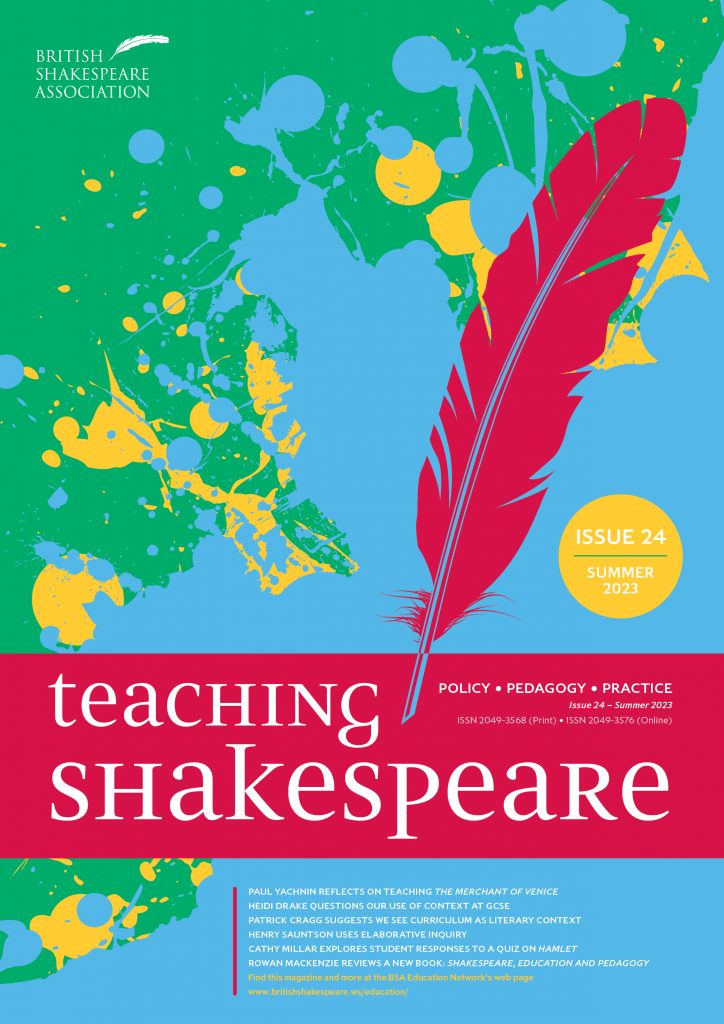
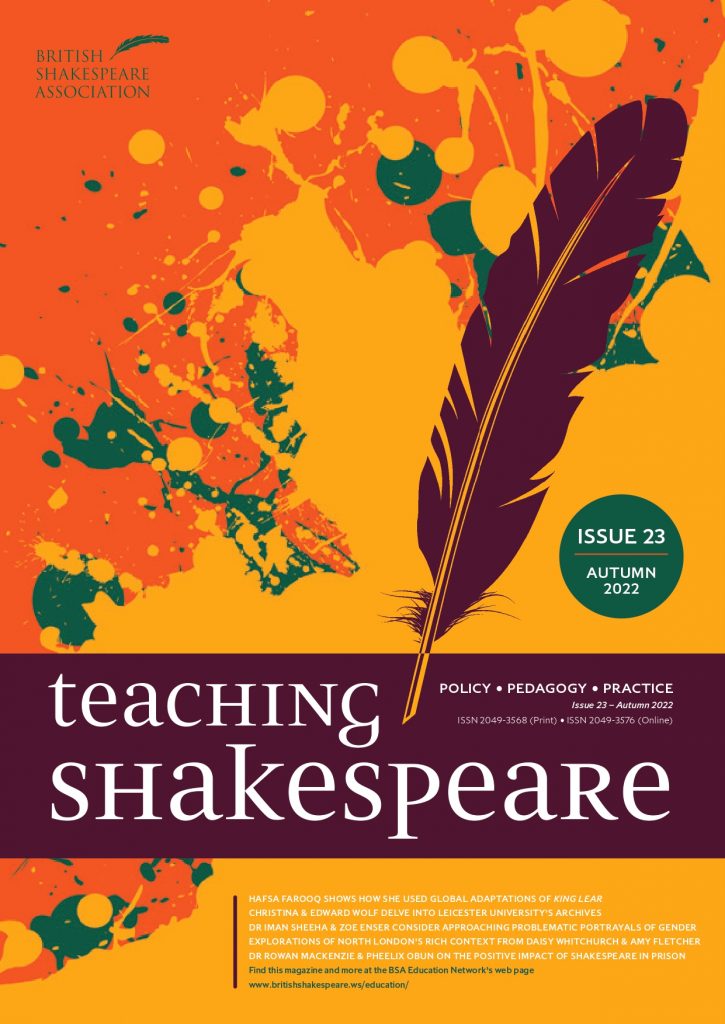
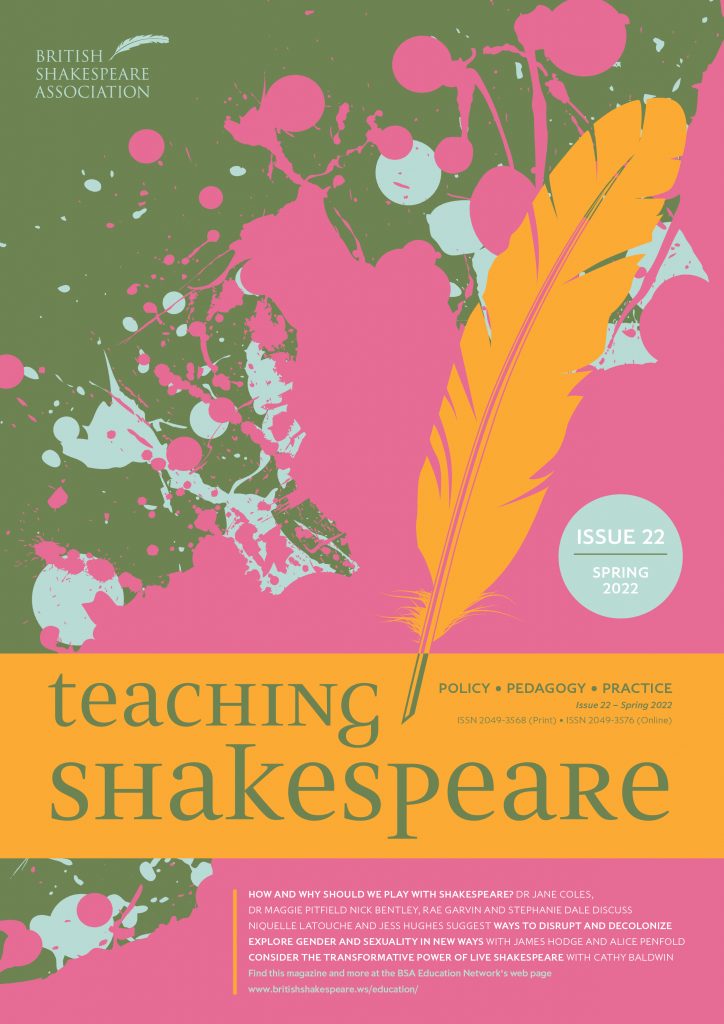
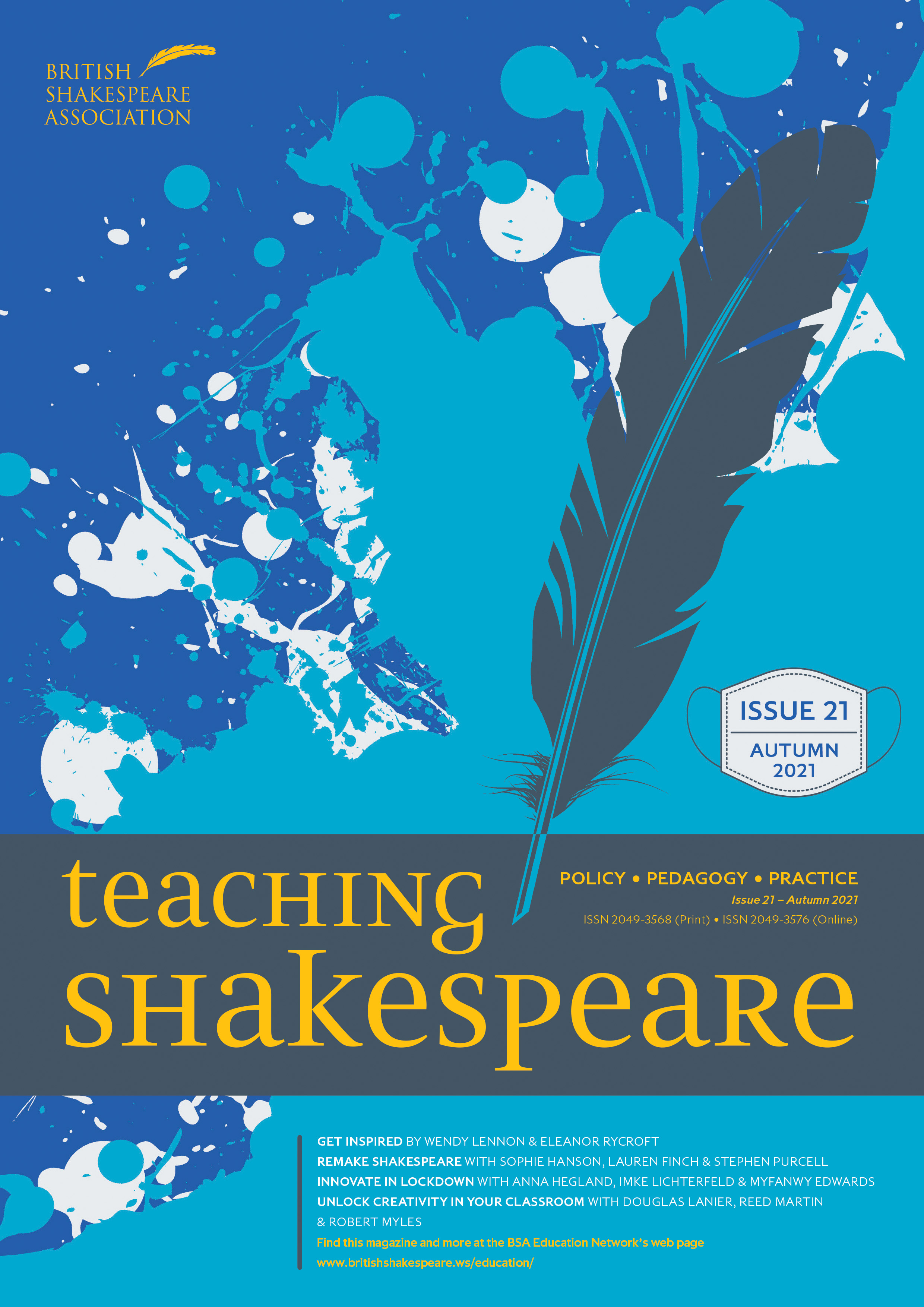
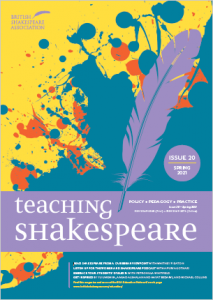
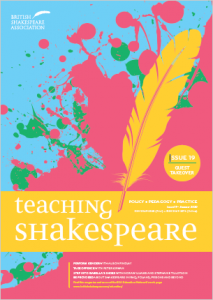
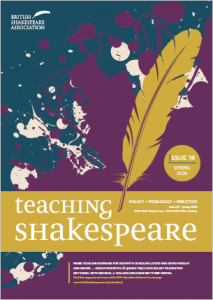
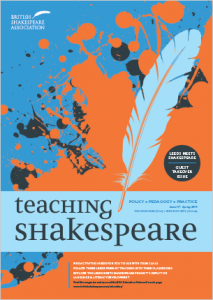
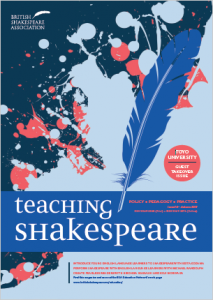
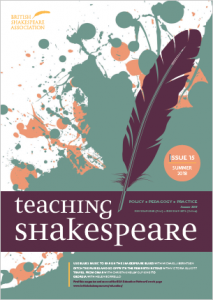
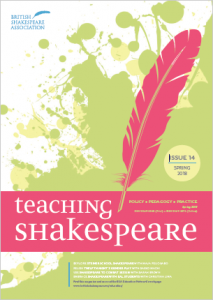
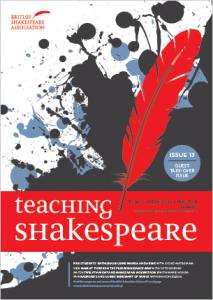
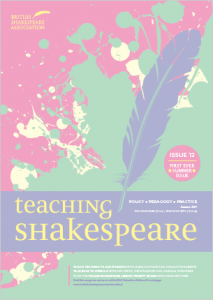
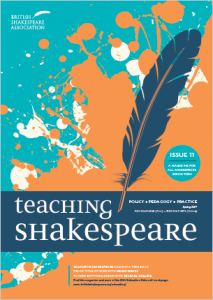
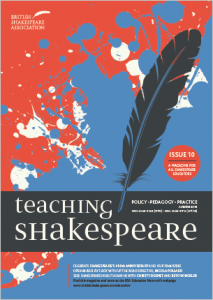
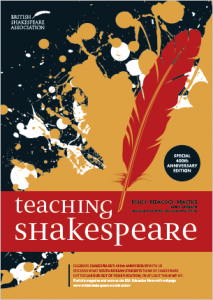
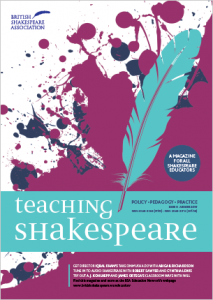
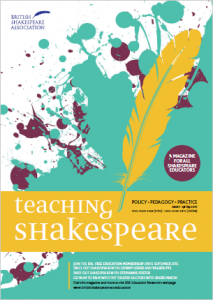
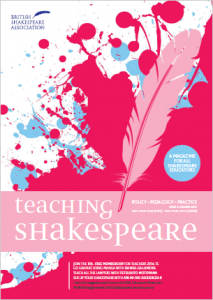
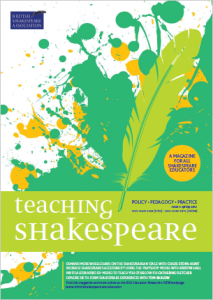
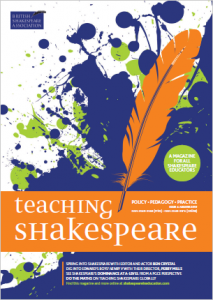
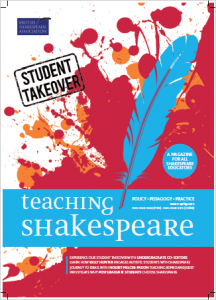
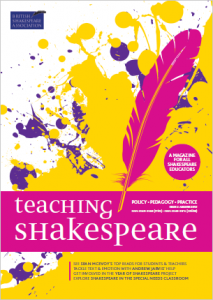
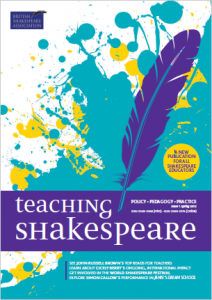
;)
;)
;)